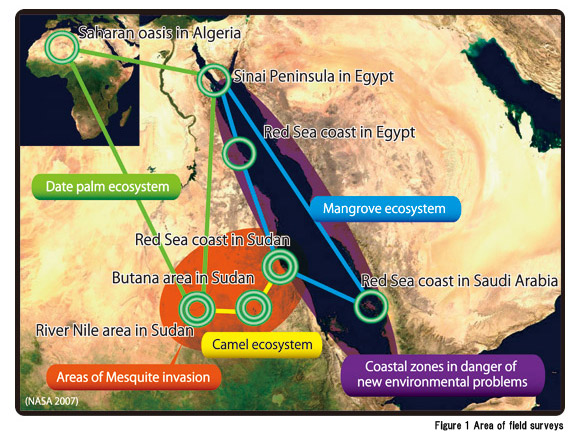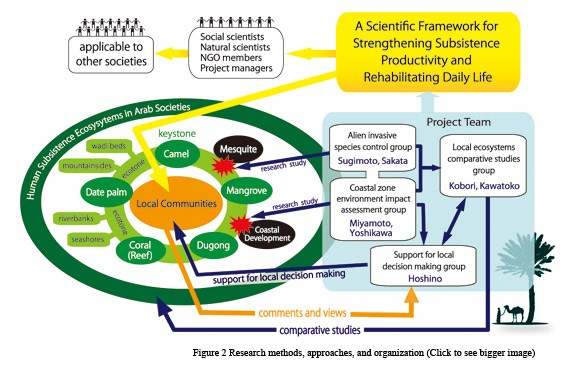- Background and objectives of the project
Japan and the oil-rich countries of the Middle East have put excessive pressures on the earth’s energy, water, and food resources. In prioritizing their own economic prosperity, these countries have exploited irreplaceable resources, such as fossil fuel and fossil water. Schemes to plant alien species have also placed stress on local ecosystems. Such practices have increased social and economic differences between the peoples of the Middle East at a time when the region faces a turning point in modern oil-based industrialization. The current fossil fuel-based interdependencies must be transformed into new relations that can support viable future societies.
Our project focuses on human subsistence ecosystems, namely the life-support mechanisms and self-sufficient modes of production (such as hunting, gathering, fishing, herding, farming, and forestry) based on low energy resource consumption. We will also re-examine the potential of advanced technology, economic development, and comprehensive measures to combat desertification. Based on our research results, we will propose a scientific framework for strengthening subsistence productivity and rehabilitating daily life in Arab societies in the post-oil era.
- Field survey of mangrove forest along the Egyptian Red Sea coast
We collaborated with the Nature Conservation Sector, Egyptian Environmental Affairs Agency, in order to conduct eco-physiological field research of mangrove forest dynamics, including stomatal conductance and transpiration rate, and to assess recent methods of mangrove afforestation. We also assessed the impact of human activity, including the influence of human livestock and managed fisheries, on mangrove ecosystems. Upon receiving permission to remove samples from the site, DNA analysis (using CTAB and RAPD techniques) was used to determine the genetic diversity and mass of Avicennia marina and to quantitatively analyze the relationship between geographical and genetic diversity.


- Conservation of traditional coral buildings in the Sinai peninsula, Egypt
At the request of the office of Islamic-Coptic Antiquities in the Supreme Council of Antiquities, Ministry of Culture, Egypt, we are now engaged in the conservation of traditional coral buildings in the Sinai Peninsula. Based on several archival sources of data concerning the architectural structure and foundation of the buildings and in collaboration with the Research Institute for Islamic Archaeology and Culture, we have drawn up a five year plan for the buildings' restoration and maintenance. This restoration project can serve as a future model of coral building cultural heritage conservation areas in the future.
- Preparation for field survey in Algeria
Project members from RIHN and the Centre National de Développement des Ressources Biologiques (CNDRB) in Algeria met on 15 December, 2009, and agreed to a Memorandum of Understanding. The main objective of this collaboration is to improve description of oasis date palm ecosystems in the Algerian Sahara.
- Further issues
We continue with full-scale field surveys in each research area. Further issues of our project in the second year (FR2) are described below. In Sudan, according to an implementation agreement concluded with Sudan University of Science and Technology in 2008, we will initiate full-scale field survey on the alien invasive species mesquite (Prosopis spp.) especially on possible biological, chemical, manual and mechanical methods for its control. We will investigate how this species may impact pastoral ecologies and will monitor its root systems and water uptake, the nutritional status of ruminants and the metabolites of their gut bacteria, and how mesquite pods and leaves may be used as human food and supplemental livestock feed. Along the Red Sea coast of Saudi Arabia and Egypt, we will start to integrate the eco-physiological study of mangroves, architectural study of coral buildings, and anthropological studies on camel herding, fishing, and hunting dugongs, in order to unveil the characteristic of human subsistence ecosystems in coastal zones of the arid tropics. In the Saharan oases in Algeria, studies will be conducted on the human subsistence date palm ecosystems in the oasis, including their history and change, and related ecological footprints.
|
|
|
|